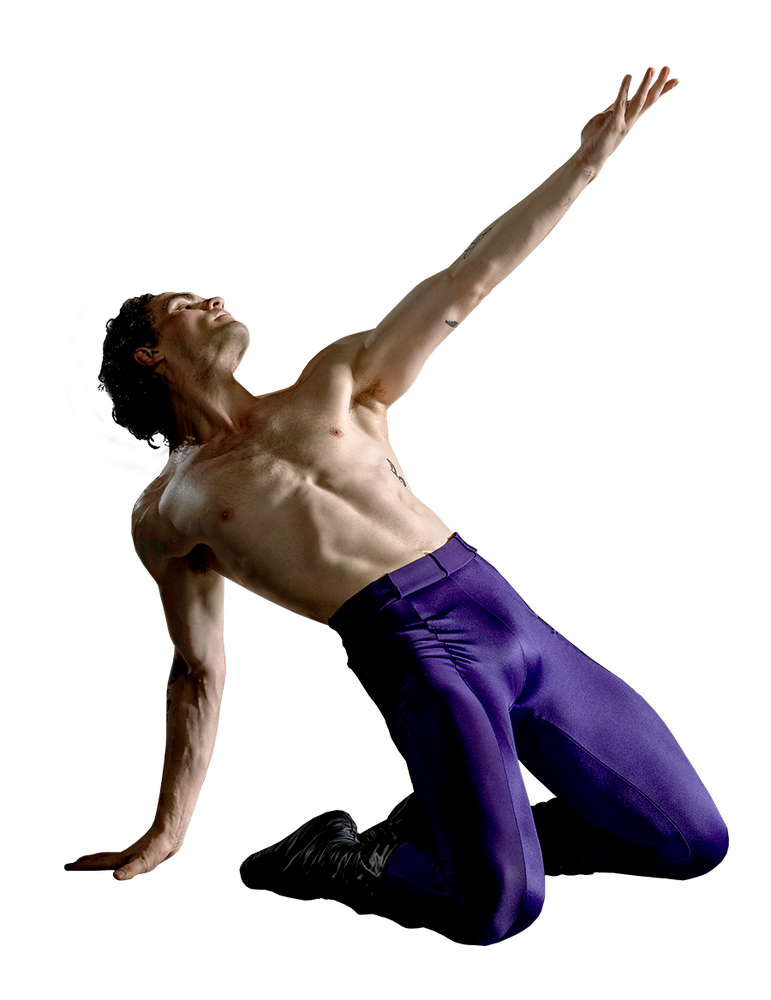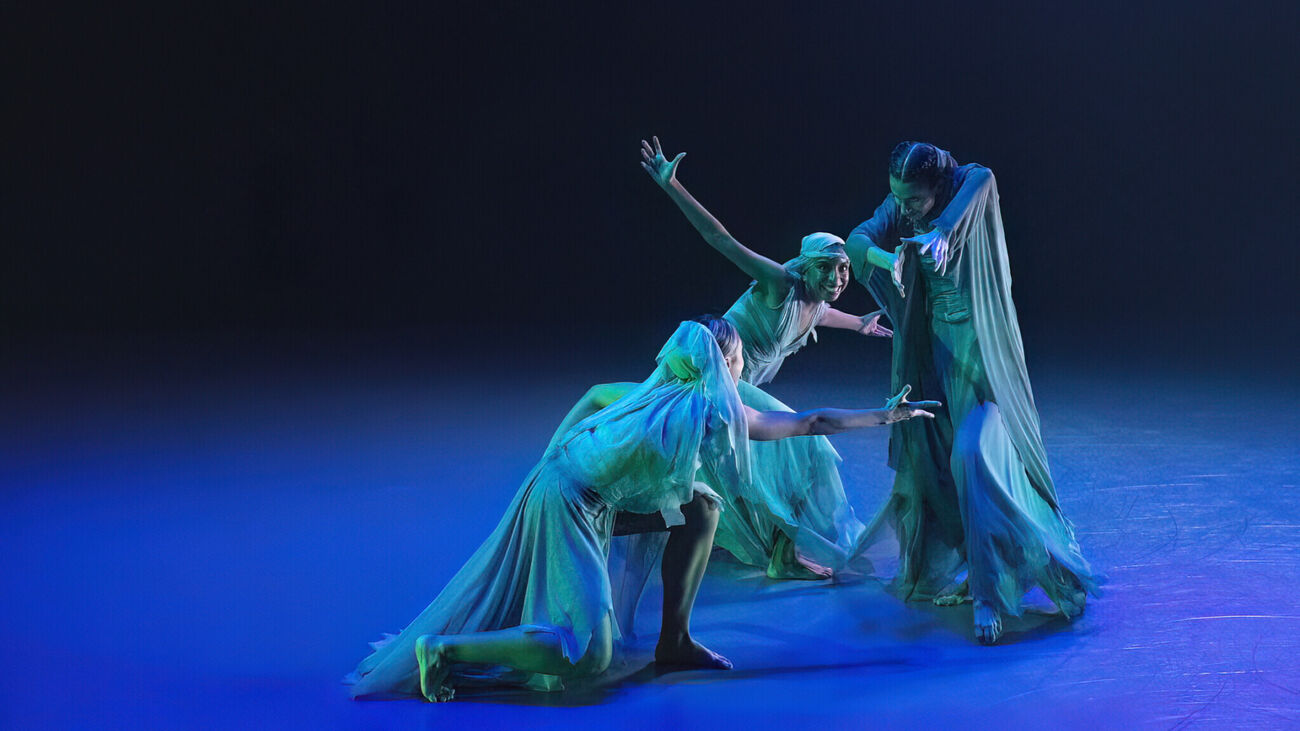

Something Wicked This Way Comes
This dynamic world premiere ballet uses contemporary dance to explore raw human psychology, revealing how ambition corrupts and power isolates. Returning to Ballet Memphis to create this innovative interpretation is Joshua L. Peugh, Founding Artistic Director of Dark Circles Contemporary Dance. Proving “there’s daggers in men’s smiles,” Peugh relies on powerful movement as the sole vocabulary to create the same psychological tension and character development that drives Shakespeare's tragedy. Featuring an original score composed by longtime collaborator Brandon Carson, and the artistic brilliance of costume designer Elizabeth Bourgeois.
Parental advisory:
This production contains
- theatrical depictions of violence (implied murder)
- dark or supernatural elements
- suspenseful and unsettling scenes
Use your own discretion for children under age 13
-
One hour forty minutes including a fifteen minute intermission
- Ballet Memphis Studio
Details
Limited capacity
Choreography: Joshua L. Peugh
Joshua L. Peugh (he/him) is the Founder and former Artistic Director of Dark Circles Contemporary Dance and Co-founder of Fair Assembly (an ensemble theatre company). A graduate of Southern Methodist University and a former dancer with Korea’s Universal Ballet (under the direction of Oleg Vinogradov), he has created work for festivals in Asia, Europe, and North America, winning awards for his choreography in South Korea, Japan, Canada, and the USA. He was the recipient of the Grand Prize at the McCallum Theatre's 18th Annual Choreography Festival, and Dance Magazine chose him as one of their "25 to Watch." Joshua served as choreographer for legendary soprano Kathleen Battle's concert Underground Railroad - A Spiritual Journey and was the 2018 recipient of the Natalie Skelton Award for Artistic Excellence. He has been commissioned to create over 60 new works for Amy Seiwert’s Imagery, BalletX, Ballet Memphis (Macbeth), Boston Dance Theater (Sweeney Todd), Saint Louis Dance Theatre (My Dear Watson), BODYTRAFFIC, Bruce Wood Dance Project, Collage Dance Collective, Company E, Dallas Black Dance Theatre, Dallas Theater Center (Colossal), Dance Kaleidoscope (The Legend of Sleepy Hollow), Dance Lab NY, DanceWorks Chicago, Eisenhower Dance, Korea National Contemporary Dance Company, MADCO, METdance, Missouri Contemporary Ballet, Newport Contemporary Ballet (The Tempest), Richmond Ballet, Tulsa Ballet, Verb Ballets (Romeo and Juliet), Water Street Dance Milwaukee, WaterTower Theater (The Ballad of Little Jo), and Whim W'Him, among others. He lives in Las Cruces, NM with his husband, Chadi El-Khoury. JoshuaLPeugh.com
Costumes: Elizabeth Bourgeois
Elizabeth Bourgeois is an award-winning costume and scenic designer whose work spans theatre, dance, circus, film, and live performance. Past collaborations with Joshua Peugh include Ten Gallon (Dark Circles Dance) and My Dear Watson (St. Louis Dance Theatre), and Boy Girl. Over the past two decades, she has designed for Broadway, Lincoln Center, MTV, PBS, and international festivals, with her work exhibited at the Prague Quadrennial and the Kennedy Center. She has also held artist residencies at Yale, MassMoCA, and Bard. In addition to her design work, Liz has recently expanded into filmmaking, with her debut film The Concert premiering in 2023. She is a recipient of the Arts of Citizenship Award from the State of Michigan, Meritorious Recognition from the Ohio House of Representatives, and an Emerging Filmmaker Award from Film Florida. She holds an MFA in Design from NYU’s Tisch School of the Arts and teaches at the University of South Florida’s School of Theatre and Dance. Audiences can view her designs for the film What We Hide on Apple TV, or catch up on works-in-progress at Instagram.com/Teamchipmunk.
Score: Brandon Carson
Brandon Carson is a composer and multi-instrumentalist from Dallas, TX. Many of the instruments that Brandon plays can heard throughout his compositions for dance, from percussion and plucked string instruments to flutes and accordions. Brandon studied classical percussion and music composition at Southern Methodist University and completed his master’s at California Institute of the Arts, where he focused on Balinese gamelan and other world music disciplines.
Folk music traditions have always interested Brandon and are a large part of his work. In Joshua L. Peugh’s Macbeth, Brandon’s goal was not only to recognize instruments from various times in Scotland, but also to bring his own voice and passions to this story. In addition to the highland pipes, flutes, drums, whistles, and harp of Scotland, you may also hear an ancient relative of the harp; the kanklės. Brandon recently studied kanklės, a Lithuanian harp-like zither, as a 2024-2025 Fulbright U.S. Student Research Grant recipient in Vilnius.
Brandon’s Fulbright purpose was to connect musically to his ancestry, and to help make Lithuanian instruments more broadly known in the process. Kanklės has roots dating back to pagan Lithuania, and many believed this instrument’s sounds were cries conjured from one’s ancestors. Brandon hopes you enjoy the fusion of this ancient zither combined with the Scottish harp in the timeless tale of Macbeth.
Lighting: Sheric Hull
Sheric Hull, M.F.A. designs lighting for ballet, contemporary dance, theatre, musical theatre, opera, concerts, and live events/tv. He is the House Lighting Designer for Ballet Memphis, where he has created designs for the professional company's repertory works, for Youth Ballet Memphis' twice yearly productions, and for Interiorworks since 2018. Beyond Ballet Memphis, Sheric designs freelance for productions ranging from intimate plays to large-scale musicals. His collaborations include Playhouse on the Square, Pinewood Performing Arts in Nebraska, where he has shaped productions for 10 years, several major festivals including Bonnaroo, Rocklahoma, and touring projects which took him around the country and internationally. Macbeth marks his first full-length ballet with the professional company.
I'll forever be grateful to Ms. Kronstad for showing us the 1971 Roman Polanski film of Macbeth my freshman year at Las Cruces High School. It ignited my deep love for Shakespeare and deeper love for this specific story. The messiness and complex humanity of Macbeth and his wife spoke to me (as did the story's super-cool witches, ghosts, cannibalistic horses, and general gothic atmosphere).
It was a real dream come true (and a bit of a surprise) when I pitched the idea of a minimally produced, quick-paced dance adaptation of Macbeth to Steven, and he said yes. Thank you for saying yes, for trusting me with your company, and for championing me as a creator.
Special thanks are also due to Emily Ernst and the rest of my Fair Assembly family for deepening my understanding of Shakespeare’s language and for answering random questions about Prince Malcolm at all hours. To James Shapiro, whose book The Year of Lear allowed me to fall in love with Shakespeare as a creator, thank you. Watching Survivor helped me see the raw humanity that drives ambition, fuels paranoia, and shatters trust. Michael, thank you for watching Midsommar, The Evil Dead, The Exorcist, and many other horror movies with me that have since crept into the show. Thank you for lending your absolute brilliance, passion, and expertise to the visual world of this show, Joel Parsons. Stephanie Elsky, our conversations have been insightful and delightful.
My wonderful, supportive parents and sister have always encouraged and supported my dreams no matter what time of day or night.
Chadi El-Khoury, “my dearest partner of greatness,” this show is for you.
The artists you see on stage tonight, as well as the ones behind the scenes (some of whom taught me Scottish sword dancing during what should have been a lunch break), found personal ways to connect to this dream and, in doing so, clarified, challenged, and improved it; this production could not be what it is with another group of people.
Finally, thank you; more than half of the performance happens on your side of the footlights. We wouldn’t have a purpose without you.
Joshua L. Peugh









